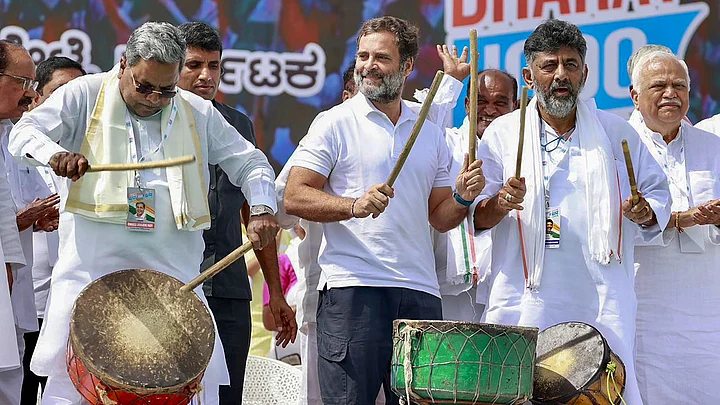On 7 and 8 May – the last two days of campaigning for the Karnataka Assembly elections – the Congress released two videos of former CM Siddaramaiah and Pradesh Congress president DK Shivakumar having a ‘heart-to-heart’ chat.
Though clearly scripted, the video sent an important message. It showed that the two leaders, considered rivals in the state Congress, are willing to work together.
The Congress had deployed a similar strategy in the Himachal Pradesh Assembly elections last year. Even there, the party managed to keep all factions amicable during the campaign. Even the campaign posters in Himachal Pradesh had the faces of the three main leaders in the state – Pratibha Singh, Sukhvinder Singh Sukhu and Mukesh Agnihotri.
This was in sharp contrast to how the party had managed the factional feuds in the Punjab Congress in the run-up to the 2022 Assembly elections.
Like in Himachal Pradesh and unlike in Punjab, a good indicator for the party is the absence of any public displays of hostility between two main claimants to the top position – Siddaramaiah and DK Shivakumar.
Truce Between Siddaramaiah and DK Shivakumar
In Karnataka, the Congress has faced difficulties in the past due to the feud between Siddaramaiah and Shivakumar. The two leaders have had frictions over control of the party, ticket distribution for candidates and policy matters affecting the state.
In 2018, when the Jarkiholi family publicly criticised Shivakumar for interfering in local polls in Belagavi, Siddaramaiah was reportedly displeased with his actions. The Belagavi incident is often cited as one of the reasons for the collapse of the Congress-Janata Dal (Secular) government in the state.
However, the present scenario in the state is a complete turnaround from the past.
Siddaramiah has been quoted as saying that his relationship with Shivakumar is cordial and that differences exist in democracy but are not detrimental to the interests of the party.
Shivakumar on his part has also been respectful of Siddaramaiah, as evident in the video in which he makes it a point to inquire about the former CM's health and address him as ‘sir’.
Role of the Central Leadership
One factor that explains this situation is the role played by the party’s central leadership. The Bharat Jodo Yatra has cemented Rahul Gandhi as the indisputable leader of the party.
The G-23 members who had been aggressive against his leadership style have either mostly come around or they have been neutralised to the extent that some of them, like Ghulam Nabi Azad, have gone out of the party in search of other power avenues.
The noise around who will lead the party in the 2024 elections has died down, as things post the yatra have become clear. The Gandhi family has been successful in managing factionalism in various states, be it Himachal Pradesh, Chhattisgarh and, now, Karnataka. This has prevented the party from facing the same challenges that it encountered in other states such as Madhya Pradesh and Punjab. The jury still may be out on Rajasthan.
In particular, in Karnataka, the central leadership has not played favorites openly. By some accounts, they seem to have encouraged some sort of intra-party competition between factions seeking to outperform each other rather than outsmart each other.
This competition is a sign of healthy inner-party democracy that helps the party consolidate its position in the state. Such a competition is a sign of a confident central leadership and an acceptance all around of its authority.
The Congress party in Karnataka has taken a calculated and pragmatic approach towards the upcoming elections. By giving equal importance to both DK Shivakumar and Siddaramaiah in their campaign material, the party is striving to balance their influence while maintaining unity within the party.
Moreover, Congress President Mallikarjun Kharge, being from the state, has played a crucial role in managing the party's internal dynamics. Given Kharge’s seniority and microscopic knowledge of Karnataka politics, it becomes difficult for any of the leaders to go against his suggestions.
Social and Class Coalitions, not Individual Leadership
Another significant factor is that the party is not relying on individual-focused leadership but is instead working on creating social coalitions in the state.
In 1972, Chief Minister Devraj Urs formed a social coalition called AHINDA, comprising Dalits, Backward Classes and minorities. The party attempted a similar formulation under Siddaramaiah between 2013 to 2018 and is now looking to repeat it. Congress president Mallikarjun Kharge is a Dalit and Siddaramaiah belongs to the Kuruba community, which falls under the backward class category. Shivakumar, a Vokkaliga, and MB Patil and Jagdish Shettar, both Lingayats, belong to two other powerful communities in the state.
Winning a politically crucial state like Karnataka would be a significant achievement for the Congress in the run-up to the Lok Sabha elections. If successful, this could serve as a template for future elections, demonstrating the party's ability to manage its internal dynamics and win elections in challenging political environments.
The success of the party's strategy of fostering healthy intra-party competition and creating social coalitions will be put to the test in the state. However, if the Congress does win, it remains to be seen how it would divide power and prominence between the two main leaders.
(Samarth Saran is a political and communications consultant. This is an opinion piece and the views expressed are the author’s own. The Quint neither endorses nor is responsible for them.)
